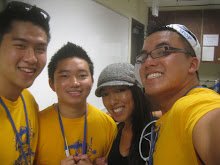You know I was a sociology major when I title my blog entries like that.
One thing that I'm still wrapping my head around is the fact that Asians are on advertisements. Growing up in the US, the only thing we ever saw was Peyton Manning doing Mastercard commercials and Dwayne Wade doing something with Powerade. The one thing I saw Yao Ming in was that funny commercial where he was trying to ask if he could pay with a check. Suffice to say, these advertisements didn't really make me want to buy or do anything.
I didn't realize how much ethnicity affected the connection between an advertisement and reception of the message the ad is trying to sell until I settled a bit more over here in Korea. I have many Asian American female friends that would often complain about being too heavy and/or how their mothers would berate them for not being thin enough. I look at them and go, "Yo, I haven't been your weight since I was 13. You're already thin!" They'd simply look at me and say "Dude, you don't get it." I guess I really didn't.
A little while ago I was talking to my co teachers at school and for some reason we'd talk about weight and stuff. I think it was because I mentioned how I was trying to lose weight. One of my co teachers responded that back in the day during her high school and early college days her main job was trying to lose weight. Her ideal goal was 45 kg, or roughly 100 lbs. She's 163ish cms, or a bit taller than 5'3. I blinked at her and said, "I haven't been 100 lbs since I was 10!" She continued and said that during those years maintaining the ideal standard of beauty was above all else in her life. Skinny first and then academics and stuff. She talked about how little she'd eat and how she longed for food, but hey, she looked good. The happy part of the story is that she eventually realized it wasn't healthy and started to eat normally again.
We continued our discussion on ads, commercials, and societal pressure on aesthetic values. Another co teacher mentioned how in the media all you see are well dressed thin Korean boys and well dressed Korean girls in heels chasing them. That trickles down to the general appearance of everyone else. I would like to point out that tonight I was out with a few buddies of mine and we were chilling at a Starbucks in Gangnam. We talked about how at work we started off wearing suits and ties and stuff in the beginning but started to slowly dress down. I jokingly said, "Yeah man, sometimes I'd put on my suit just to go to the coffee shop to read a book." A friend said, "Hahaha you're funny man." I then pointed out that everyone around us, except us silly foreigners, were pretty much in suits.
However I digress.
Personally, sometimes I feel like I'm succumbing to all the ads and such. The other day I was walking home from work and I thought to myself, "Hmmm, maybe I should get long hair." This is rather shocking in that I absolutely hate long hair on myself. Ugh.
Quick Hits -
Did you know that the hood of a car is called a "bonnet" in the UK? I guess it's similar in that it's something you'd put over your head.
Coffee shops are absolutely ginourmous in Korea. Restaurants are a little bit on the smaller side because people just go in, eat, and go out and get coffee where they'll chill for hours. When I say ginourmous I mean the small ones are about the size of an average McDonald's, I've encountered one that's bigger than some mall bookstores.
My students think it's absolutely cute when I speak Korean, even when I say something like "gah bul ji mah" which means stop messing around. They just kinda giggle and say "SAY AGAIN!"
The other day I was talking to a Cantonese friend of mine and I asked what "mo-ah" meant. The conversation went something like this.
Her: "Nothing."
Me: "But I know it means something!"
"Oh, it's nothing."
"But it's in all those movies!"
"It's nothing."
"Then how come Jackie Chan always says it!?!?"
"I mean, the meaning of the word, is nothing."
Also speaking with the same friend whom emigrated from HK to Canada so she learned British English. She told us an anecdote about how she asked a male classmate if she could borrow a "rubber". In British English, "rubber" is an eraser. In Canadian and American English, it's ...well you know.
My East Coast friend and myself got into an argument about the difference between sweatSHIRT and sweater. In his definition a sweatshirt was a thick long sleeved top that kept the wearer warm. A sweater is similar but different in that it is knit and you can see/feel the patterns on it. My stance is that sweater and sweatshirt were essentially the same and that it's sufficient to call both items sweaters. Also I told him that I was right because the West Coast is better the Lakers beat the Magic. We agreed to disagree.
I find that my writing skills are lacking recently when chatting with my friends the other day. I'm trying to write more to consistently use the skills I acquired while earning the degree that my dad paid so much for. Thanks Dad.
Wind Farm
4 months ago



